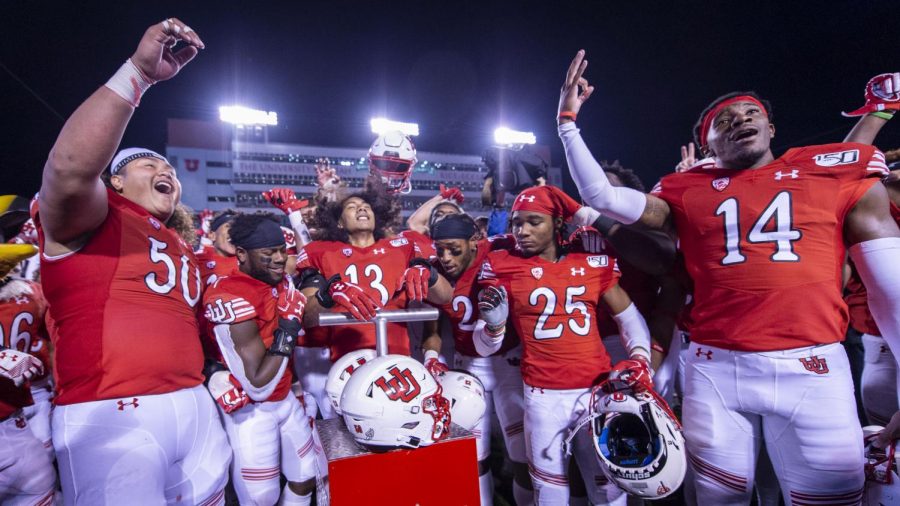The Dream of an Eight-Team College Football Playoff
The University of Utah football team sings the Utah fight song following an NCAA Football game vs. Washington State at Rice Eccles Stadium in Salt Lake City, Utah on Saturday, Sept. 28, 2019. (Photo by Kiffer Creveling | The Daily Utah Chronicle)
October 30, 2019
Jan. 1, 2005. This day would be etched in college football history when a school outside of the formerly known Bowl Championship Series would take part in a BCS game.
The University of Utah would not only take part in the Tostitos Fiesta Bowl, but they would dominate the Pittsburgh Panthers during this matchup. Two years later, the Boise State Broncos would cement themselves alongside Utah as the second mid-major program to bust the BCS. These two schools, alongside the University of Hawaii and Texas Christian University, would be the main reasons why the Bowl Championship Series disbanded in 2013, and the College Football Playoff began.
Is the new system good enough, though? Or can it be updated to include more schools like the 2004 and 2008 Utah Utes alongside each conference champion from Power Five schools?
I would propose that the College Football Playoff be expanded to eight teams in order to incorporate each of the top teams in the nation. Each year, the debate sounds something like “Will the College Football Playoff Committee choose a one-loss Ohio State Buckeyes team that won their conference, or a one-loss Alabama Crimson Tide team who didn’t even make their conference championship game?” or “Should an unbeaten UCF squad get in over a one-loss Power Five school?”
The answer to both of these questions should’ve been an astounding yes. What the College Football Playoff Committee chose to do, though, is leave out Ohio State in favor of adding a second SEC team into the playoff while UCF was left out two years in a row because their schedule wasn’t tough enough.
Can you imagine the uproar it would’ve caused to see Utah not get into the BCS after going undefeated? All we wanted was a shot at the big boys, and we took advantage of those chances. It was these chances among other things that ultimately piqued the interest of the Pac-12, who would eventually bring the U in as the 12th member of the conference in 2012.
The Utes got their shots at the big boys, but what if they would have had the opportunity to play for a national championship? A Reggie Bush-led USC team and a Tim Tebow led Florida team in 2004 and 2008 respectively would’ve been tough teams to beat, but Utah would’ve had a legitimate chance to win either of those games. We will never know, though, because the Utes weren’t given a chance.
In an eight-team playoff, not only would each of the Power Five conference champions get automatic bids, but it allows for second-place Power Five teams to get a shot at the National Championship. If a group of five teams run the table and goes undefeated, they would get an automatic shot at the playoff, which gives them a chance to win the National Championship.
Will there still be people left out and arguments to who should be ranked where? Absolutely. But what this structure will do is allow each Power Five conference champion into the playoff while also giving a chance to the mid-major programs who go undefeated.
It would add one more week to the football season, but who wouldn’t want that? The fans get more time to watch football, the players and coaches get more time to play and coach football and the NCAA benefits even more from the games. It seems like a win, win, win situation.
What I’m not saying is that there needs to be a March Madness type of a tournament. Although the college basketball postseason is one of the most sought-after NCAA playoffs, basketball isn’t even close to the physical toll put on football players.
Adding a massive excess of games will only hurt the NCAA, but adding one more game to either side of the bracket will be enough to still maintain the health of the players while also catering to the needs of the schools and fans.
Eventually, I would argue that the eight-team playoff will make an appearance. And when it does, we will see a better college football product be put on the field. Fans won’t give up their playoff hopes on their favorite teams after one loss, and no matter what a team’s record is, there is always a fighting chance to make a playoff.
If and when the College Football Playoff expands to eight teams, everyone will be getting a shot. No more arguments. No more questions. Time to put up or shut up.









mike padgett sr • Oct 31, 2019 at 11:44 am
its only fair you treat the college football like the college world series. it gives enough teams a chance to make the playoffs interesting !!!
Aaron Bernhardt • Oct 30, 2019 at 6:17 pm
Why not host the big bowls with conference champions which acts as the 8 team play off system. With roughly 130 teams in the Division 1 category, if we choke it down to 8 divisions we can do 16 teams a division. Split it into a North/South or East/West situation. 16 groups, 16 teams for conference championships, 8 teams move on to the big bowl games, 4 go on to semi finals and 2 for the championship game. Eventually you can end up with 1 school winning their conference, bowl, semi finals, and finals game